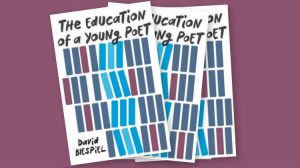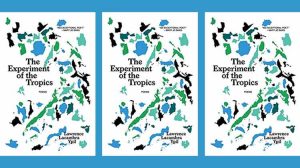Feet of the Messenger by H.C. Palmer / BkMk Press / 9781943491100 / 2018
 Everything is here and now — childhood, beauty, war, peace — all apiece of a tapestry woven by the expert hands of the warrior poet H.C. Palmer in his debut collection, Feet of the Messenger. The collection of free verse, culled in three sections, presents the entangled memories of a Kansas wheatgrass boy, surgeon, sportsman and person of deep faith, through the lens of the war in Vietnam. From the very first poem to the last, Palmer wrestles with the tug and extent of remembrance, violence, and salvation with bloodstained hands and a survivor’s testament.
Everything is here and now — childhood, beauty, war, peace — all apiece of a tapestry woven by the expert hands of the warrior poet H.C. Palmer in his debut collection, Feet of the Messenger. The collection of free verse, culled in three sections, presents the entangled memories of a Kansas wheatgrass boy, surgeon, sportsman and person of deep faith, through the lens of the war in Vietnam. From the very first poem to the last, Palmer wrestles with the tug and extent of remembrance, violence, and salvation with bloodstained hands and a survivor’s testament.
Published by BkMk Press out of the University of Missouri-Kansas City, the collection is a first for the Renaissance man who was raised on the grasslands of the Sunflower State, played football for its namesake university; became a doctor; went over to Vietnam and served as a battalion surgeon, and all before having a career in such things as diverse as livestock-raising, and sports medicine. Today, at 75, he coaches war veterans, and their families, on the merits of creative action to counter the destructive acts of their pasts. Feet of the Messenger was recently awarded a State Library of Kansas distinction of being named one of the “Notable Books of 2018.” The book is dedicated to family, including the “Men of October 1965.”
All hail the warrior poet for the unique vision carried to the page. Battle-beaten, but not destroyed, their regard is forevermore borne of what came before, and what is to be done afterwards, having witnessed and outlived a great and violent disruption. For such a poet, the world is a triptych splayed and exposed, and they, chrysalis-like, haunted, and grateful, soar over it, singing in warning and message, drenched in a beautiful ache. Palmer’s Feet of the Messenger has such divisions and such power.
The book deals firstly with his time as a battalion surgeon in Vietnam; the second section is an extended, multi-poem meditation on beauty/death; the final section focuses on prairie life. Throughout the collection, the poems contain the many threads of Palmer’s lives — as young boy, surgeon, cattleman, fly-fisherman, and grandfather. Palmer is a narrative poet, with a great sense of movement, imagery and is unsentimental, yet knows that beauty saves the world — perhaps having saved his own life. He understands his experiences has immersed him in a language different than others. That he has a story to tell. That he is a man of war, of violence, but also of land and quietude.
When he considers a landscape or a quiet moment it is often draped in memory, of course, a remembering both idyllic and stunning, but tinged with loss in its gathering realization and expression. Given the tableau of carnage and chaos wrought in Vietnam, he is more than up for the challenge of recognizing finitude and its striking pangs so oddly beautiful. This is where we readers benefit the most and why the collection, arranged in a trio of vantage points from natural fecundity, to finality, and a force with which the living cast their gaze, succeeds. Palmer has a inimitable viewpoint from which to dissect beauty and its many forms, eternal and transient — in “Selected Notes on Beauty” section, “June 7, 1942, Eastern slope, the Flint Hills, Kansas” he writes:
from the smell of it, beyond the creek bottom and big cottonwoods
to the top of an incline and a tallgrass prairie wind where I consider
for the first time what makes something beautiful:
hills emerging from deep shadows—sun-brightened tops,
treeless and leveled as if worked by father’s carpenter’s plane;
early summer bluestem rustling at my knees and a sky so big
I sense a loneliness—like presence at the Creation. It’s beautiful
I say, and he says, Yes, more beauty than we can take in.”
The collection opens with “Shot at Close Range,” an impressive overture-like poem covering the collection’s main themes. The poem ostensibly about hunting introduces the ethereal way memory invades and overtakes. Fowl blood morphs into the blood of a soldier. In “If I Die in a Combat Zone,” and “A Season of War” the weaving continues. In the former, Palmer asks that should he be killed let it be by sniper’s bullet, drawing upon the image of Jesus upon the cross for the rifleman’s crosshairs; in the later, hunting doves with a childhood friend shifts into their wartime experiences.
There are clear-cut vignettes of war — “Counting Boys in a Truck,” “Thompson’s Prayer,” and “Tho’ Hòa Bình” to name a few in the first section before giving way via a series of poems of conventional life tinged by the shadow of war violence, such as “In The Bread Aisle in Safeway” and “Considering a Landscape,” before the collection comes to an interlude of poems on the miasma of beauty and death. “Considering…” about a memory intruding upon a domestic flight and a conversation with a seatmate, asks of its author whether or not he should be over the war:
I’m trapped at the door of a Huey again –
Trembling & sweating & cold. I grab an airsick bag.
C’mon man, he says, It’s thirty years since that war.
You should be over it by now.
Palmer’s not over it, and we can’t blame him nor the thousands of others involved. It’s what we do with what we know that counts. For the Kansas poet it’s an acceptance that he’s willing to admit the world is vast and unfathomable, yet filled with grace, and we cannot know what’s going to happen next. We have our recollections to move forward as best we can. In “Belated Notes to Mother,” the words of his mother come as some kind of intercession,
Each night a new word—retraced and redefined
until I fell asleep. Soon this world will be a better place,
you promised. One day you can use these words to tell your story.
To that end, Palmer weaves through prairies fields with kith and kin; he wades in morasses private, and public — veterans move in and out, ghosts and memory fragmented and he searches for a place to land from which the story of his life will grow. He knows that ultimately to come to know a place, to search for a place, amidst these phantom limbs, these specters and ardent hope is to, “see and know a place” as a, “contemplative act,” he argues quoting Gretel Ehrlich. H.C. knows what he loves — his family, his farming history and the prairie earth, “I am still in love,” he writes in “After Driving Cattle in the Flint Hills.” He appreciates a good prairie town, it’s “tame edges.” having “grown wild,” he observes in “Elegy for a Prairie Town: Reflections on a Shallow Map of the Flint Hills.” But he sees more than undulating hills, of wheat, sunflower. Palmer sees, “layers of ancient seabed,” the “uncovering of fossils/of floaters and swimmers, the matrix/of old life,” beneath the surface of things in “Spring Matrix.” Comes to understand the majesty of nature’s transformative power on the land, and on himself. In “The Work of Turkey Vultures” he speaks of its powerful cruel efficiency —“Dissection and digestion is their craft—/transforming a carcass to vapor and dust./The real work, what is to be done.
His best poem “Tide” is a homage to where he’s from, to that once “immense sea.” Which to his soul is “still alive” with its “natural rhythms” and “breaking surf.” The “land tide,” where the prairies “lift” beneath his feet, or messenger, his father letting his son know to pay attention son, pay attention, “There, That’s it”—the magic of the prairie. The great disruption—the signal and noise of war, of great violence and death—does not deter the message from traveling from generation to generation. Palmer finds himself on the prairie in West Kansas with his granddaughter who wants to understand his passion for the land—the “swell of grass,” and the “seed head.” He writes: “When I explain the tops of these hills were set level by sediment from the Permian sea, she loops my arm in hers.” In “Connections”, his second best poem of the collection he wanders through the “blue stems,” the “Indian grass. A purple coneflower.” They pick an “orange bloom from a butterfly milkweed,” from which Palmer transfers from being in the surgeon’s hand dropping it into hers. These are “artifacts” he is giving her of what lies at her own feet, amongst the legion of the dead, and the “mortared…prairie footings.” For “Prairie incursions” forever reminds him of where he’s been, and where he’ll end up, a memory too, but a “survivor.” Palmer writes in “Sunset at Lower Fox Creek School”:
We slide between strands of barbed-wire fence. (His grandson now) wades through ungrazed bluestem, arms raised like wings, clipping the tops of ripe seed heads until we come to a ledge of limestone. Good place to sit, I say, Let’s listen while we wait.
Everything is here and now.




Leave a Reply